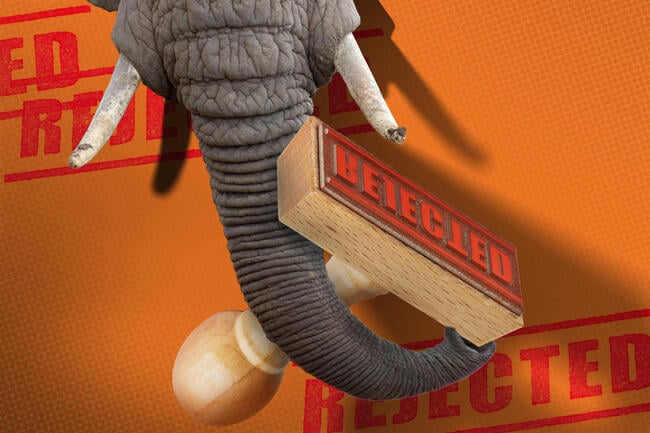You have /5 articles left.
Sign up for a free account or log in.

If the proposed rules come to pass, researchers fear funding will be allocated according to political interest.
Photo illustration by Justin Morrison/Inside Higher Ed | paci77/iStock/Getty Images | Pexels
Hundreds of scientists are pushing back against a federal policy proposal that would make it easier to fire grant makers, among many other government employees, who don’t adhere to the Trump administration’s political whims.
In April, the Office of Personnel Management posted to the Federal Register a proposed rule “to increase career employee accountability” by allowing agencies to quickly remove from critical positions employees “who engage in misconduct, perform poorly, or undermine the democratic process by intentionally subverting Presidential directives.” That could include any employee with “substantive participation and discretionary authority in agency grantmaking,” such as those involved in drafting funding opportunity announcements, evaluating grant applications and recommending or selecting grant recipients.
But researchers, former government employees and public policy experts believe the rule would further politicize scientific research in the United States, which has been supported for decades by grants to faculty from federal agencies such as the National Science Foundation, the National Institutes of Health and the Department of Energy.
“For decades, federally funded science and health research has relied on nonpartisan public servants with extensive subject matter knowledge and regulatory expertise to evaluate and administer competitive grants in ways that are rigorous, objective, and unbiased,” Lizbet Boroughs, associate vice president for government relations and public policy at the Association of American Universities, wrote in an email to Inside Higher Ed. “Allowing political appointees without that expertise to make crucial grantmaking decisions and provide grant oversight could compromise vital research.”
More than 33,000 public comments were submitted in response to the proposal.
“It is crucial that politics be kept out of the scientific grant-making process,” Joshua Gordon, former director of the National Institute of Mental Health, wrote in one. “Making scientific leaders at NIH political appointees, characterizing them as policymaking positions is detrimental to the mission of the NIH, and threatens the health and economic bases on which our nation depends.”
The proposed rule is open for public comment until midnight on June 7. After that, the government is required to review and respond to the issues raised in the comments and could face a lawsuit if it doesn’t do so before implementing the policy.
The backlash to the proposed change comes after federal agencies terminated thousands of existing grants that mentioned now-verboten topics such as minority health, vaccine hesitancy, climate change and diversity, equity and inclusion.
OPM’s rule would help codify the government’s ability to make ideologically driven decisions on what is and isn’t worthy of research funding, which has long been under the purview of nonpartisan government employees and academic peer reviewers. But this isn’t the first time Trump, who pledged to “fire rogue bureaucrats” during his campaign, has attempted to reclassify thousands of federal employees who are currently entitled to appeal if they are removed, suspended or demoted.
Greater ‘Risk of Corruption’
In the last months of his first term in office, Trump created the “Schedule F” classification for employees in policy-influencing career positions that agencies could “expeditiously remove” for “poor performance or misconduct, such as corruption or for injecting partisanship into the performance of their official duties.” But before the rule could go into effect, President Joe Biden was elected and overrode it.
Now, the second Trump administration is moving to revive the Schedule F classification policy (the new rule refers to such workers as “schedule policy/career” employees)—first with an executive order issued in January, which is facing a lawsuit, and more recently with the proposed OPM rule. At the same time, the administration has also asked Congress to drastically reduce the amount of money available in fiscal year 2026 for research at the NIH, NSF and numerous other agencies that fund academic research by the billions.
If both proposals come to pass, it will change the calculus for faculty members competing for federal grant funding, which has long been considered essential to advancing their research and careers.
“Whatever money is available is going to be distributed based on political interest,” said Mary Feeney, a public affairs professor at Arizona State University and a former program director at the NSF. “There’s already an inequitable distribution of research funding across the country—certain states, universities and researchers get more than others. We’d see even more of that because now the primary predictor of getting the money would be political connections. And there are some researchers, universities and senators that are more politically connected than others.”
But the revived rule is just one of multiple methods the Trump administration is using in an attempt to control federally funded scientific research and the civil service employees who support it.
Last month, Trump issued an executive order to restore “gold standard science,” in part by putting “a senior appointee designated by the agency head” in charge of tracking “alleged violations” of the order. While the order says it aims to ensure that federally funded science is “transparent, rigorous, and impactful,” 7,440 scientists have since signed a letter arguing that it hijacks scientific language and “further consolidates political control over the Nation’s scientific infrastructure.”
Additionally, OPM issued a memo on May 29 outlining a new “merit hiring plan” that would put agency leaders in charge of the hiring process and require federal job applicants—including those applying for positions that help administer research grants—to explain, among other things, how they would help “advance the President’s Executive Orders and policy priorities.”
Donald Moynihan, a professor of public policy at the University of Michigan, said these measures will “reduce capacity, performance and quality of government while increasing the risk of corruption in delivery of public services.”
That’s of special concern to government employees whose roles involve evaluating the merits of scientific research.
“Factual information is a core part of what scientists do—they try to discern what is factually true about the state of the world and the most promising ways to generate new facts about how the world might be able to work,” he said, noting that some of the research priorities the Trump administration has put forth, such as proving that vaccines cause autism, run counter to established scientific fact. “Politicizing these positions will make the American government a less credible and less effective investor in science.”
Historical Parallels
Historical examples already exist that back up that prediction, said Melinda Baldwin, a history professor at the University of Maryland who researches science and technology policy.
“One hundred years ago, every scientist in the world agreed that the United States was a second-rate backwater country when it came to scientific research. There were a lot of reasons that changed, but one of them was that the Nazi regime destroyed German science,” she said, noting that up until Adolf Hitler began firing Jewish scientists and other civil servants who didn’t align with his ideological vision for the country, “Germany was the beating heart of scientific research.”
Germany’s descent into fascism and its focus on pursuing debunked lines of scientific inquiry, such as “race science,” created an opening for the United States to take up the charge of global scientific leadership post–World War II.
And the United States has been able to make that happen over the past 80 years by investing in research, such as the Human Genome Project, that has outlived presidential administrations of both parties. That kind of innovation will be harder to maintain when a revolving door of political appointees are deciding what kinds of research the government should fund.
“This would create a situation where federal funding could become untenable for certain kinds of ambitious, large-scale projects,” Baldwin said. “What we’re going to see if this happens is a bunch of short-term, small-thinking projects that can be completed before the next election.”




